 W
WThe Tank, Cruiser, Challenger (A30) was a British tank of World War II. It mounted the QF 17-pounder anti-tank gun on a chassis derived from the Cromwell tank to add anti-tank firepower to the cruiser tank units. The design compromises made in fitting the large gun onto the Cromwell chassis resulted in a tank with a powerful weapon and reduced armour. The extemporised 17-pounder Sherman Firefly conversion of the US-supplied Sherman was easier to produce and, with delays in production, only 200 Challengers were built. The Challenger was able to keep up with the fast Cromwell tank and was used with them.
 W
WAEC Armoured Car is the name of a series of British heavy armoured cars built by the Associated Equipment Company (AEC) during World War II.
 W
WAEC Armoured Command Vehicle was a series of command vehicles built by the British Associated Equipment Company (AEC) during the Second World War.
 W
WThe Alecto was a self propelled gun developed by the British during World War II. Initially known as Harry Hopkins Mk 1 CS
 W
WThe Self Propelled 17pdr, Valentine, Mk I, Archer was a British self propelled anti-tank gun of the Second World War based on the Valentine infantry tank chassis fitted with an Ordnance QF 17 pounder gun. Designed and manufactured by Vickers-Armstrongs, 655 were produced between March 1943 and May 1945. It was used in North-West Europe and Italy during the war; post-war, it served with the Egyptian Army. This vehicle was unusual in that its gun faced the rear of the chassis instead of the front.
 W
WThe Armadillo was an extemporised armoured fighting vehicle produced in Britain during the invasion crisis of 1940–1941. Based on a number of standard lorry (truck) chassis, it comprised a wooden fighting compartment protected by a layer of gravel and a driver's cab protected by mild steel plates. Armadillos were used by the RAF Regiment to protect aerodromes and by the Home Guard.
 W
WThe Bedford OXA was a British heavy armoured car, produced during the Second World War.
 W
WThe Bishop was a British self-propelled artillery vehicle based on the Valentine tank and armed with the 25 pounder gun-howitzer, which could fire an 87.6 mm (3.45 in) 11.5 kg (25 lb) HE shell or an armour-piercing shell. A result of a rushed attempt to create a self-propelled gun, the vehicle had numerous problems, was produced in limited numbers and was soon replaced by better designs.
 W
WThe Bison was an extemporised armoured fighting vehicle frequently characterised as a mobile pillbox. Bisons were produced in Britain during the invasion crisis of 1940-1941. Based on a number of different lorry chassis, it featured a fighting compartment protected by a layer of concrete. Bisons were used by the Royal Air Force (RAF) to protect aerodromes and by the Home Guard. They acquired the generic name "Bison" from their main manufacturer.
 W
WThe Tank, Infantry, Mk IV (A22) Churchill was a British heavy infantry tank used in the Second World War, best known for its heavy armour, large longitudinal chassis with all-around tracks with multiple bogies, its ability to climb steep slopes, and its use as the basis of many specialist vehicles. It was one of the heaviest Allied tanks of the war.
 W
WThe Tank, Infantry, Mk IV (A22) Churchill was a British heavy infantry tank used in the Second World War, best known for its heavy armour, large longitudinal chassis with all-around tracks with multiple bogies, its ability to climb steep slopes, and its use as the basis of many specialist vehicles. It was one of the heaviest Allied tanks of the war.
 W
WThe Tank, Infantry, Mk IV (A22) Churchill was a British heavy infantry tank used in the Second World War, best known for its heavy armour, large longitudinal chassis with all-around tracks with multiple bogies, its ability to climb steep slopes, and its use as the basis of many specialist vehicles. It was one of the heaviest Allied tanks of the war.
 W
WThe Coventry armoured car (AFVW19) was a British four wheel drive armoured fighting vehicle developed at the end of the Second World War as a potential replacement for the lighter Humber and Daimler armoured cars.
 W
WThe Daimler Armoured Car was a successful British armoured car design of the Second World War that continued in service into the 1950s. It was designed for armed reconnaissance and liaison purposes. During the postwar era, it doubled as an internal security vehicle in a number of countries.
 W
WThe Daimler Scout Car, known in service as the Daimler Dingo, was a British light, fast four-wheel drive reconnaissance vehicle also used for liaison during the Second World War.
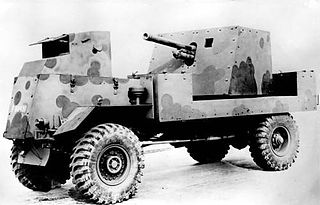 W
WThe AEC Mk I Gun Carrier, known as Deacon, was a British armoured fighting vehicle of the Second World War. It was an attempt to make the QF 6 pounder anti-tank gun into a self-propelled artillery piece. It was employed only during the North African Campaign from 1942 to 1943.
 W
WThe Guy Armoured Car was a British armoured car produced in limited numbers during Second World War. The car saw limited action during the Battle of France.
 W
WThe Guy Lizard Armoured Command Vehicle was a British command vehicle built during Second World War.
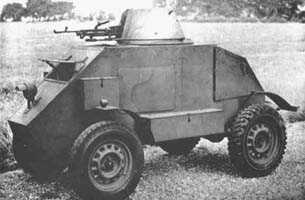 W
WThe Hillman Gnat was an experimental World War II era light armoured car developed in Britain.
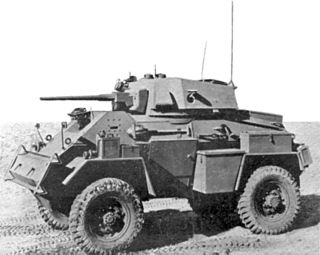 W
WThe Humber Armoured Car was one of the most widely produced British armoured cars of the Second World War. It supplemented the Humber Light Reconnaissance Car and remained in service until the end of the war.
 W
WThe Humber Light Reconnaissance Car, also known as Humberette or Ironside, was a British armoured car produced during the Second World War.
 W
WThe Humber Scout Car was a British light scout car used in the Second World War. It entered service in 1942 and continued in production until 1945. Designed for reconnaissance, and liaison between armoured units, it provided protection only against light arms fire, so was not a front line vehicle. More importantly it was small and fast and could quickly evade trouble. It became the shape format for the post war Ferret armoured car which began production in 1952.
 W
WA Kangaroo was a Canadian armoured personnel carrier (APC) during the Second World War which was created by converting a tank chassis. Kangaroos were created as an expedient measure "in the field" by the Canadian Army, and were so successful that they were used by British and Commonwealth forces.
 W
WThe Lanchester 6x4 armoured car was a British armoured car with a 6x4 drivetrain produced in limited numbers in the late 1920s and early 1930s. A heavier, more rugged development of the earlier Lanchester 4x2 armoured car, it remained in service with Territorial and colonial units until the early 1940s and saw action in the Battle of Malaya.
 W
WThe Leyland Beaver-Eel, known officially as the Tender, Armoured, Leyland Type C, was an armoured truck used by the Royal Air Force throughout World War II for airfield defence duties.
 W
WThe Loyd Carrier was one of a number of small tracked vehicles used by the British and Commonwealth forces in the Second World War to transport equipment and men about the battlefield. Alongside the Bren, Scout and Machine Gun Carriers, they also moved infantry support weapons.
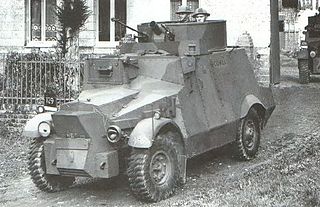 W
WThe Morris CS9/Light Armoured Car was a British armoured car used by the British Army in the Second World War.
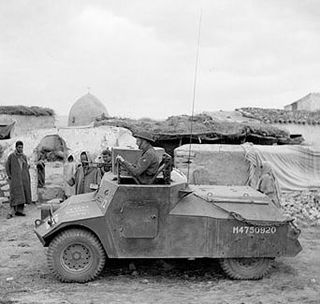 W
WMorris Light Reconnaissance Car (LRC) was a British light armoured car for reconnaissance use produced by Morris Motors Limited and used by the British during the Second World War.
 W
WThe Rolls-Royce Armoured Car was a British armoured car developed in 1914 and used during the First World War, Irish Civil War, the inter-war period in Imperial Air Control in Transjordan, Israel and Mesopotamia, and in the early stages of the Second World War in the Middle East and North Africa.
 W
WThe 25pdr SP, tracked, Sexton was a Canadian-designed self-propelled artillery vehicle of the Second World War. It was based on Canadian-built derivatives of the American M3 Lee and M4 Sherman tank chassis. Canada had setup to produce the Ram tank using the M3 chassis and Grizzly to complement US medium tank production; when Sherman production in the US expanded and supply was no longer a problem, it was decided in 1943 to switch the Canadian production lines to produce the Sexton to give the British Army a mobile artillery gun using their 87.6 mm (3.45 in) Ordnance QF 25 pounder gun-howitzer for commonality with towed guns. The Sexton could fire either HE shell or an armour-piercing shell. It found use in the Canadian and British Army, as well as numerous other British Empire and associated forces. Just after the war, a number of Grizzly and Sextons were sold to Portugal, who used them into the 1980s.
 W
WStandard Car 4x2, or Car Armoured Light Standard, better known as the Beaverette, was a British armoured car produced during the Second World War.
 W
WThe Universal Carrier, also known as the Bren Gun Carrier and sometimes simply the Bren Carrier from the light machine gun armament, is a common name describing a family of light armoured tracked vehicles built by Vickers-Armstrongs and other companies.